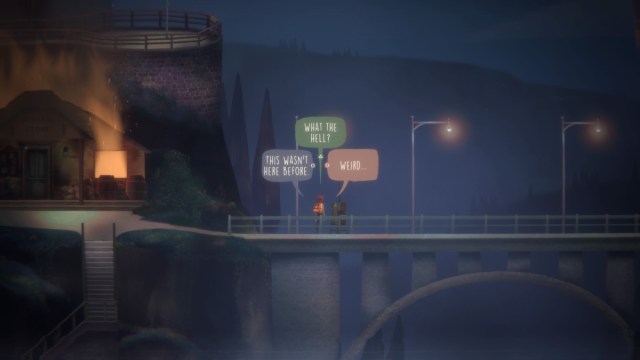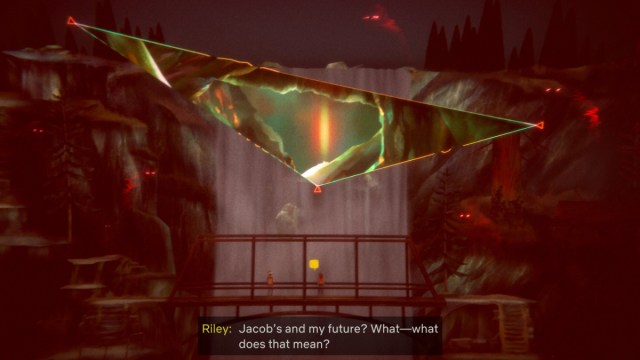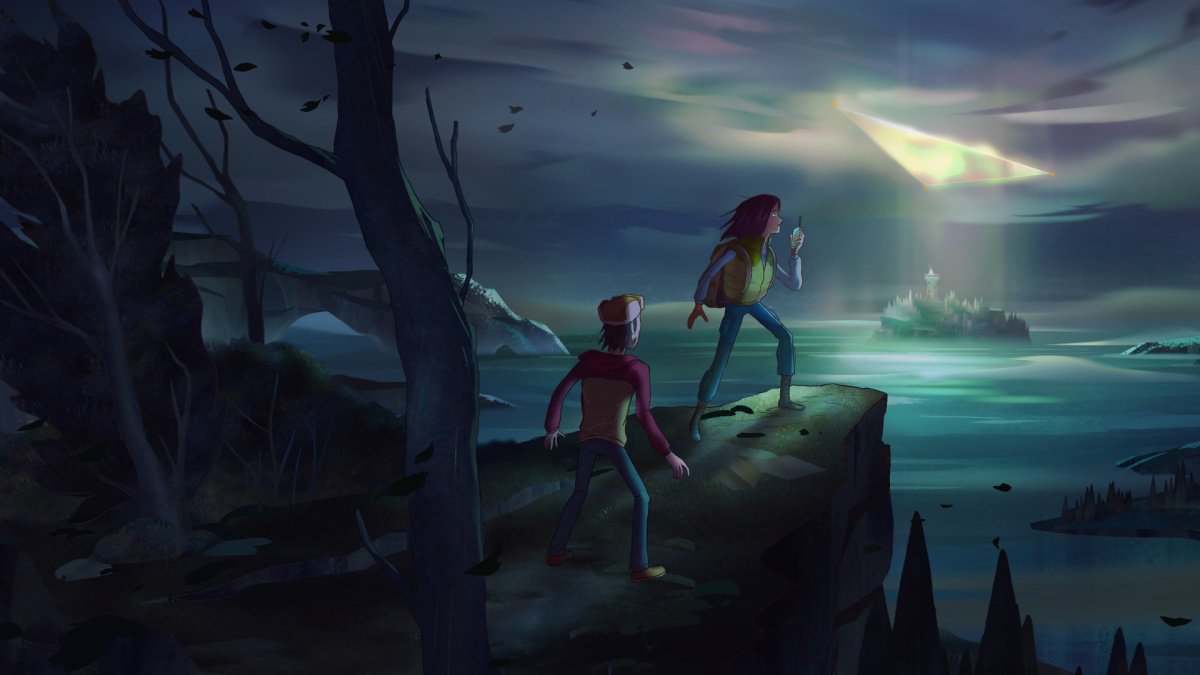Oxenfree II: Lost Signals on PlayStation 5
Video Game sequels can be tricky to pull off, especially when they offer a continuation of their predecessor’s story. Not only do they need to offer a continuation or conclusion to what came before them, but they also need to innovate on what came before them to show their potentially lengthy development time was worth the wait. Oxenfree II: Lost Signals is no exception to these factors, but fortunately for fans, it proves itself more than capable of meeting these expectations.
Set roughly five years after the events of the series’ first game, Night School Studio‘s title places players into the shoes of a new protagonist: Riley Poverly, a vagabond who has returned to her hometown after several years to work a job installing transmitters for a local survey project. She’s joined by Jacob Summers, a local with unfulfilled aspirations and his own inner demons to deal with.
The two are quickly forced to contend with a massive Tear caused by the sinister forces from the first game, and decide to try and close it and every other rip in the fabric of reality for good. Doing so won’t be easy though, as forces new and old are intent on taking advantage of the strange phenomena for their own goals. The two will need to work together if they want to have any hope of overcoming these factions and reclaiming any sense of a peaceful life moving forward.

The plot plays out over the course of about eight hours, but it’s far from a shallow experience. The narrative weaved over the course of these brief hours feels expertly crafted, drawing one in with an emotional and compassionate tale of righting past wrongs and establishing new connections with others. Alongside it are a variety of side stories one can uncover, expanding the otherwise limited cast to include a wide array of smaller stories that can be explored or ignored at the player’s discretion.
The exceptional voice acting only enhances the experience further. Whether it’s via the line deliveries given for Riley and Jacob’s myriad conversations or the interactions between the main pair and their supporting cast, every performance feels well done and impactful. I never once felt like a line delivery was overly forced, exaggerated, or subpar, and that had me all the more engrossed in every conversation I was lucky enough to stumble across.
The fact that Oxenfree II: Lost Signals also offers a myriad of meaningful dialogue choices to make also bolstered the experience as a whole. Whether it’s through small conversations or major turning points in the narrative, the game provides players with a metric ton of ways to alter their experience in ways that can and do impact their playthroughs. Being kind and considerate could lead to a character seeing you in a new light; or, it could lock you out of an advantageous option further down the line.

And that’s speaking strictly to choices with less immediate consequences. Like in the original Oxenfree, there are decisions one can make that drastically alter the fates of different characters, impacting both the active plot and which of three core endings one receives before the credits roll.
The end result is a narrative adventure which was far deeper than I could have imagined. I was floored by how several minor dialogue choices I made throughout the game culminated in a bevy of different outcomes by the climax, and how the side stories I did or didn’t take the time for also played into the conclusion in major and minor ways alike. This remained true across several playthroughs too, and had me dying to see what other outcomes my choices could create.
Visually, Oxenfree II: Lost Signals nails the same aesthetic as the original title. 3D characters move through gorgeous 2D environments, their personalities popping thanks to subtle yet distinct design elements tied to their clothes, postures, and so forth. The environments, meanwhile, can feel both serene and oppressive thanks to subtle shifts in lighting, perspective, and coloration, as well as the sudden blips of more haunting elements and vibes.
One minute, a winding forest trail can feel like the most peaceful place in the world; the next, it could be utterly terrifying thanks to a quick jump scare and an unnerving glitch of red static at the edges of the characters’ periphery.

As for flaws, there are only two that are hard to ignore. The first is that the moment to moment gameplay of Oxenfree II: Lost Signals isn’t as solid as everything around it. Granted, this isn’t much of an issue during one’s initial playthrough: When one is going through segments for the first or second time, the slower movement speed isn’t as noticeable thanks to the engaging dialogue and sheer amount of different choices to make.
Once players dive in for a replay though, the repeated bits of dialogue make it harder to ignore how much of a slog it is to go from one area to the next. There’s no real way around this either, as the game is designed around making the trek from one area to another sans any sort of fast travels or shortcuts.
There are also some technical issues which, while never too frustrating, can lead to some frustrating moments. These range from characters hitching on geometry and being unable to leave an area to interactive items not triggering properly. Most of them require the reload of an auto-save as a fix, hampering the flow of the dialogue and story.
Overall though, Oxenfree II: Lost Signals is everything fans could want from a sequel. Though it might not be flawlessly designed, it builds on what came before it and offers plenty of new and compelling stories as it ties up the loose plot threads from the first game. Fans of narrative and choice-driven experiences owe it to themselves to check this game out as soon as possible.
Pros
Cons
Slow movement speed hampers replays.
